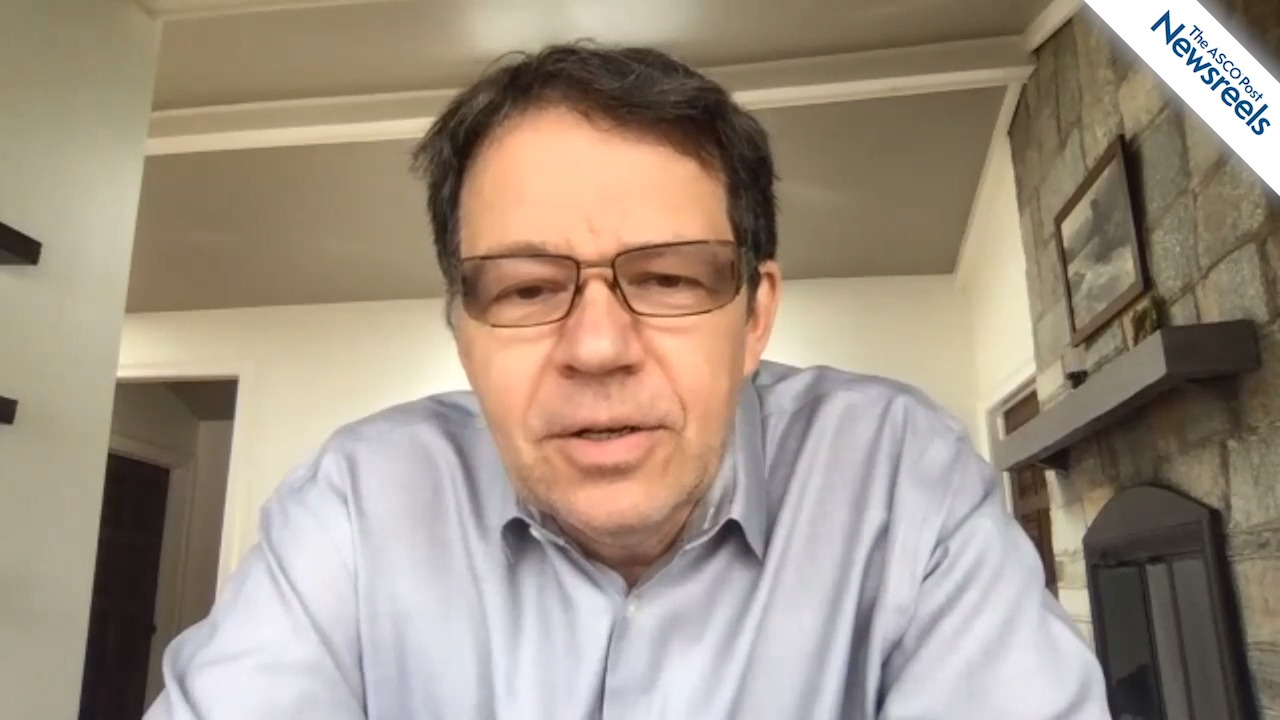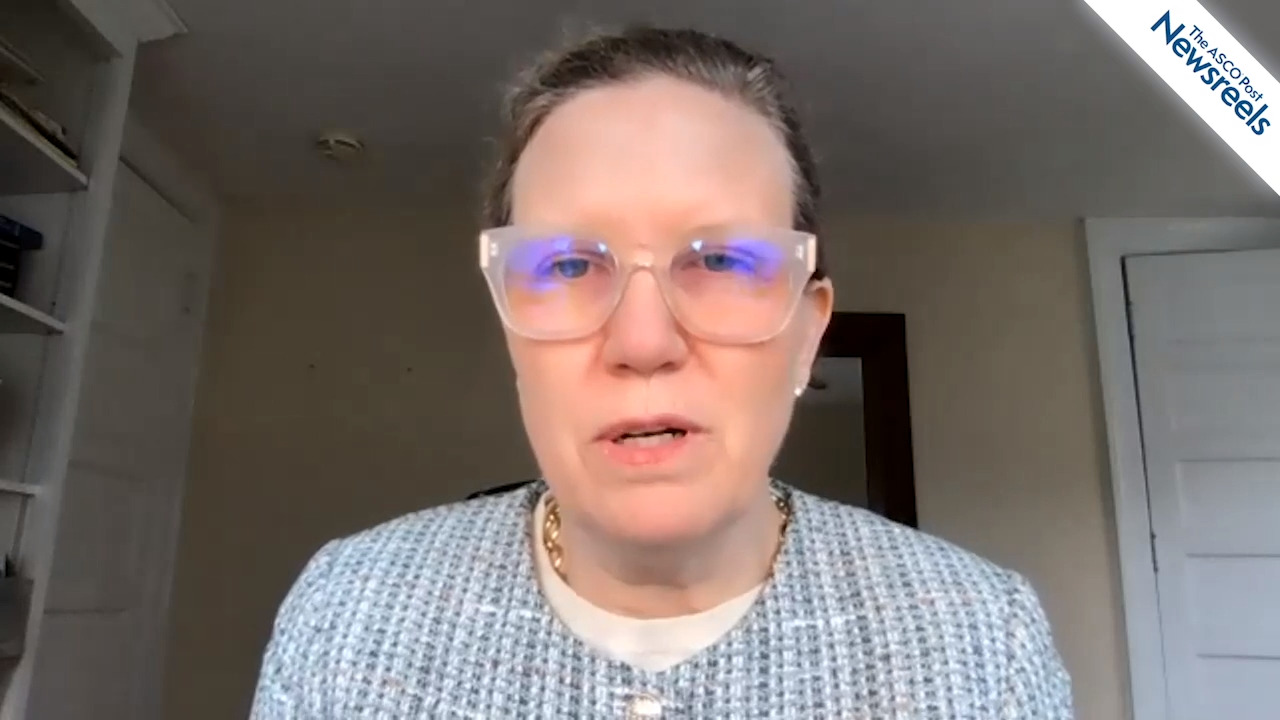FDA Pipeline: Bemarituzumab Granted Breakthrough Therapy Designation for FGFR2b-Overexpressing, HER2-Negative Gastric Cancer
The U.S. Food and Drug Administration (FDA) granted Breakthrough Therapy designation to bemarituzumab as first-line treatment for patients with fibroblast growth factor receptor 2b (FGFR2b)-overexpressing and HER2-negative metastatic and locally advanced gastric and gastroesophageal adenocarcinoma...
Glofitamab for Relapsed or Refractory B-Cell Lymphoma
In a phase I trial reported in the Journal of Clinical Oncology, Hutchings et al found that the bivalent CD20-targeting T-cell–engaging bispecific antibody glofitamab produced high response rates and was associated with manageable toxicity in patients with predominantly refractory aggressive B-cell ...
FDA Grants Accelerated Approval to Dostarlimab-gxly for dMMR Endometrial Cancer
On April 22, the U.S. Food and Drug Administration (FDA) granted accelerated approval to dostarlimab-gxly (Jemperli) for adult patients with mismatch repair–deficient (dMMR) recurrent or advanced endometrial cancer, as determined by an FDA-approved test, that has progressed on or following a prior...
Improvement in Survival With Adjuvant Pembrolizumab for Resected Stage III Melanoma
As reported in The Lancet Oncology by Alexander M.M. Eggermont, MD, and colleagues, the pivotal phase III EORTC 1325/KEYNOTE-054 trial has shown significant improvement in the secondary endpoint of distant metastasis–free survival—as well as continued benefit in the primary endpoint of...
Tisotumab Vedotin in Recurrent or Metastatic Cervical Cancer
In a phase II study (innovaTV 204/GOG-3023/ENGOT-cx6) reported in The Lancet Oncology, Robert L. Coleman, MD, and colleagues found that the tissue factor–directed antibody-drug conjugate tisotumab vedotin produced durable responses in previously treated patients with recurrent or metastatic...
Pembrolizumab Monotherapy for Heavily Pretreated Patients With Metastatic Breast Cancer and High Tumor Mutational Burden
Findings from the ASCO-designed phase II Targeted Agent and Profiling Utilization Registry (TAPUR) basket trial, reported in the Journal of Clinical Oncology by Alva et al, indicated that pembrolizumab showed activity in heavily pretreated patients with metastatic breast cancer and high mutational...
Genitourinary Oncology Highlights 2020–2021 Almanac
Landmark changes in the treatment of genitourinary cancers have occurred over the past year, as summarized in this year’s Genitourinary Oncology Almanac from The ASCO Post. Starting with our area of focus, metastatic renal cell carcinoma, the saga continues with two more positive phase III trials...
Immune Checkpoint Inhibitors and Cutaneous Toxicity: Population-Level Analysis
Immune checkpoint inhibitors have transformed treatment for many advanced cancers, but short-term clinical trials and small observational studies have linked the medications with various side effects, most commonly involving the skin. A more comprehensive, population-level analysis now provides a...
FDA Pipeline: Recent Designations in Urothelial Cancer, Cervical Cancer, Cholangiocarcinoma, and More
Recently, the U.S. Food and Drug Administration (FDA) issued regulatory decisions related to treatments for urothelial cancer, cervical cancer, cholangiocarcinoma, solid tumors, and colorectal cancer. Acceptance of Two Supplemental Biologics License Applications for Enfortumab Vedotin-ejfv in...
Addition of Avelumab to Chemoradiotherapy in Previously Untreated Patients With Locally Advanced Head and Neck Cancer
As reported in The Lancet Oncology by Nancy Y. Lee, MD, and colleagues, the phase III JAVELIN Head and Neck 100 trial showed no improvement in progression-free survival with the addition of the PD-L1 inhibitor avelumab to chemoradiotherapy in patients with previously untreated locally advanced...
FDA Approves Nivolumab in Combination With Chemotherapy for Metastatic Gastric Cancer and Esophageal Adenocarcinoma
Today, the U.S. Food and Drug Administration (FDA) approved nivolumab (Opdivo) in combination with fluoropyrimidine- and platinum-containing chemotherapy for advanced or metastatic gastric cancer, gastroesophageal junction cancer, and esophageal adenocarcinoma. CheckMate 649 The efficacy of the...
Georgina V. Long, MD, PhD, on Melanoma: Nivolumab Plus Ipilimumab vs Nivolumab Alone
Georgina V. Long, MD, PhD, of the Melanoma Institute Australia, University of Sydney, discusses results of the CheckMate 915 trial, which may reinforce nivolumab as an adjuvant standard of care in patients with stage IIIB–D/IV melanoma, with or without complete lymphadenectomy (Abstract CT004).
Michel Sadelain, MD, PhD, on the Road to Synthetic Immunity: Novel CAR Designs
Michel Sadelain, MD, PhD, of Memorial Sloan Kettering Cancer Center, discusses the challenges in developing CAR T-cell therapy, as well as the progress being made, such as creating hybrid CAR and T-cell receptors that should enable T cells to recognize much lower levels of antigens. The field, he says, is poised to take on a range of solid tumors to extend the successes in hematologic malignancies.
First-Line Pembrolizumab vs Chemotherapy for MSI-H or dMMR Metastatic Colorectal Cancer: Health-Related Quality of Life
In an analysis from the phase III KEYNOTE-177 trial reported in The Lancet Oncology, Thierry André, MD, and colleagues found that pembrolizumab was associated with clinically meaningful improvements in health-related quality of life (HRQOL) compared with chemotherapy in the first-line treatment of...
Charlotte E. Ariyan, MD, PhD, on Metastasectomy After Immunotherapy: Is It Effective?
Charlotte E. Ariyan, MD, PhD, of Memorial Sloan Kettering Cancer Center, discusses improved outcomes with metastasectomy in the setting of checkpoint inhibitors, with the removal of residual disease and “escape” lesions. Surgical outcomes may also be better than targeted treatments, although long-term data and biomarkers are needed to confirm these findings.
Integration of Brentuximab Vedotin Into Front-Line Treatment for Pediatric Patients With High-Risk Hodgkin Lymphoma
In a study reported in the Journal of Clinical Oncology, Metzger et al found that the integration of brentuximab vedotin into front-line treatment of pediatric patients with high-risk classical Hodgkin lymphoma resulted in avoidance of radiotherapy in many patients, as well as high rates of...
Short-Term Safety of the BNT162b2 mRNA COVID-19 Vaccine in Patients Receiving Immunotherapy
In an Israeli case-control study reported in a commentary in The Lancet Oncology, Waissengrin et al found that the short-term safety of the Pfizer BNT162b2 mRNA COVID-19 vaccine was similar in patients with cancer receiving immune checkpoint inhibitors compared with healthy controls. Study Details...
Melinda L. Telli, MD, on HER2-Positive Breast Cancer: NCCN Guidelines Update
Melinda L. Telli, MD, of Stanford Cancer Institute, discusses highlights of the new NCCN Clinical Practice Guidelines in Oncology®, including nonanthracycline, taxane-based regimens as preferred treatments for patients with HER2-positive breast cancer; newly approved combination therapies such as tucatinib plus capecitabine plus trastuzumab, margetuximab plus chemotherapy, and neratinib plus capecitabine; and recommendations for third line and beyond.
Richard S. Finn, MD, on Treating Hepatocellular Carcinoma With Atezolizumab, Bevacizumab, and Sorafenib
Richard S. Finn, MD, of UCLA Medical Center, discusses updated efficacy and safety data from the IMbrave150 trial of patients receiving atezolizumab plus bevacizumab vs sorafenib as first-line treatment for unresectable hepatocellular carcinoma (Abstract CT009).
Katelyn T. Byrne, PhD, on the Clinical Impact of T-Cell Inflammation in the Tumor Microenvironment
Katelyn T. Byrne, PhD, of the Perelman School of Medicine at the University of Pennsylvania, discusses the first in-depth analysis of the impact of selicrelumab, an anti-CD40 antibody, which was found to enrich T cells in pancreatic tumors, activate the immune system, and alter the tumor stroma (Abstract CT005).
Carey K. Anders, MD, on Brain Metastases: Integrating Immunotherapy Into Clinical Care
Carey K. Anders, MD, of the Duke Cancer Center, discusses the ways in which treatment of brain metastases arising from solid tumors has moved into a new era of patient care and how the field may advance.
First-Line Tislelizumab Plus Chemotherapy vs Chemotherapy Alone in Advanced Squamous NSCLC
In the Chinese phase III RATIONALE 307 trial reported in JAMA Oncology, Wang et al found that tislelizumab plus chemotherapy significantly prolonged progression-free survival vs chemotherapy alone in the first-line treatment of patients with advanced squamous non–small cell lung cancer (NSCLC). As...
Adjuvant Nivolumab for Resected Esophageal or Gastroesophageal Junction Cancer After Neoadjuvant Chemoradiotherapy: CheckMate 577
As reported in The New England Journal of Medicine by Ronan J. Kelly, MBBCh, MBA, and colleagues, an interim analysis of the phase III CheckMate 577 trial has shown a significant improvement in disease-free survival with adjuvant nivolumab vs placebo in patients with resected esophageal or...
Cancer Aneuploidy May Predict Response to Immunotherapy in Patients With NSCLC
Lower levels of cancer aneuploidy were associated with more favorable outcomes after immune checkpoint inhibition in patients with non–small cell lung cancer (NSCLC), according to data presented by Alessi et al at the virtual American Association for Cancer Research (AACR) Annual Meeting 2021...
Tumor Mutational Burden as Predictor of Immune Response: Variance Between Female and Male Patients With Melanoma
Tumor mutational burden (TMB) was an accurate predictor of response to treatment with immune checkpoint inhibitors for female patients with melanoma, but not for male patients, according to results of a study presented by Sinha et al during the virtual American Association for Cancer Research...
FDA Grants Accelerated Approval to Sacituzumab Govitecan-hziy for Advanced Urothelial Cancer
On April 13, 2021, the U.S. Food and Drug Administration (FDA) granted accelerated approval to sacituzumab govitecan-hziy (Trodelvy) for patients with locally advanced or metastatic urothelial cancer who previously received a platinum-containing chemotherapy and either a PD-1 or PD-L1 inhibitor....
Brian I. Rini, MD, on Renal Cell Carcinoma: Data on Atezolizumab, Bevacizumab, and Sunitinib
Brian I. Rini, MD, of Vanderbilt University, discusses the IMmotion151 trial results on overall survival and the association of gene expression and clinical outcomes with atezolizumab plus bevacizumab vs sunitinib in patients with locally advanced or metastatic renal cell carcinoma (Abstract CT188).
Pediatric Patients With High-Grade Gliomas: Treatment With Oncolytic HSV-1 G207 Immunovirotherapy
In a phase I trial reported at the virtual American Association for Cancer Research (AACR) Annual Meeting 2021 (Abstract CT018) and simultaneously published in The New England Journal of Medicine, Friedman et al found that oncolytic virotherapy with genetically engineered herpes simplex virus-1...
Long-Term Follow-up of Children and Young Adults With B-Cell ALL Treated With CD19 CAR T-Cell Therapy
In a long-term follow-up of a National Cancer Institute (NCI) phase I trial reported in the Journal of Clinical Oncology, Nirali N. Shah, MD, and colleagues found that autologous CD19 chimeric antigen receptor (CAR) T-cell therapy followed by allogeneic hematopoietic stem cell transplantation can...
Patrick M. Forde, MD, on NSCLC: Nivolumab and Chemotherapy as Neoadjuvant Treatment
Patrick M. Forde, MD, of the Sidney Kimmel Comprehensive Cancer Center at Johns Hopkins University, discusses results from the CheckMate 816 trial, which showed that adding nivolumab to chemotherapy as a neoadjuvant treatment for patients with resectable non–small cell lung cancer improved the pathologic complete response rate to 24%, compared to 2.2% with chemotherapy alone (Abstract CT003).
Rita Nanda, MD, on Triple-Negative Breast Cancer: Emerging Therapeutic Strategies
Rita Nanda, MD, of the University of Chicago, discusses the latest data on novel treatment strategies for triple-negative breast cancer, including immune checkpoint, PARP, and ATK inhibitors; antibody-drug conjugates; and targeting the androgen receptor.
Neoadjuvant Nivolumab Plus Chemotherapy Boosts Pathologic Complete Response Rate for Patients With Resectable NSCLC
Neoadjuvant nivolumab plus platinum-doublet chemotherapy significantly improved pathologic complete response (pCR) rates compared with chemotherapy alone in patients with resectable stage IB to IIIA non–small cell lung cancer (NSCLC), according to results of the randomized, phase III, open-label...
Early-Phase Study Explores CAR T-Cell Therapy for Relapsed or Refractory B-Cell Lymphoma
Bispecific anti-CD19/CD20 chimeric antigen receptor (CAR) T-cell therapy was well tolerated and showed signs of clinical efficacy in patients with relapsed/refractory B-cell lymphoma, according to phase I clinical trial data presented by Ghafouri et al during week 1 of the virtual American...
Expert Point of View: Xin Gao, MD
Xin Gao, MD, a medical oncologist at Mass General Hospital and Instructor at Harvard Medical School, said these were important findings. “Analyses of patient-reported outcomes pertaining to health-related quality-of-life measures from CheckMate 9ER showed significantly improved quality-of-life...
Patient-Reported Outcomes With Nivolumab Plus Cabozantinib in Advanced Renal Cell Carcinoma
Results of the CheckMate 9ER phase III trial showed significantly improved patient-reported outcomes in quality of life for first-line treatment with nivolumab plus cabozantinib compared with sunitinib for patients with advanced renal cell carcinoma.1 These findings are in line with the previously...
Expert Point of View: Ursula Matulonis, MD
Invited discussant, Ursula Matulonis, MD, Chief of the Division of Gynecologic Oncology at Dana-Farber Cancer Institute, Boston, applauded the improved outcomes favoring lenvatinib/pembrolizumab in the confirmatory KEYNOTE-775 trial. “This represents the start of a new era in endometrial cancer...
Lenvatinib/Pembrolizumab Improves Survival in Advanced Endometrial Cancer
In the first report from the pivotal phase III KEYNOTE-775/Study 309 trial, the combination of lenvatinib, a multikinase inhibitor of VEGFR1, VEGFR2, and VEGFR3 kinases, and pembrolizumab significantly improved multiple outcomes compared with standard single-agent chemotherapy in patients with...
Adverse Events in Patients With Melanoma Treated With Ipilimumab: Results of a Toxicity Monitoring Program
In a single-institution study reported in JCO Oncology Practice, Menjak et al found that a nurse-led telephone surveillance program for toxicity associated with ipilimumab in patients with metastatic melanoma led to earlier identification of toxicities and earlier intervention, with an apparent...
FDA Grants Regular Approval to Sacituzumab Govitecan-hziy for Pretreated Patients With Triple-Negative Breast Cancer
On April 7, 2021, the U.S. Food and Drug Administration (FDA) granted regular approval to sacituzumab govitecan-hziy (Trodelvy) for patients with unresectable locally advanced or metastatic triple-negative breast cancer who have received two or more prior systemic therapies, at least one of them...
Role of Antibody-Drug Conjugates Across Breast Cancer Subtypes
For the treatment of breast cancer, antibody-drug conjugates are emerging as effective players that could impact all subtypes of this disease, according to Kevin Kalinsky, MD, MS, Director of the Glenn Family Breast Cancer at the Winship Cancer Institute of Emory University, Atlanta. In the...
Pembrolizumab in Microsatellite Instability–High Advanced Gastric or Gastroesophageal Junction Cancer
In an analysis reported in JAMA Oncology, Joseph Chao, MD, and colleagues found improved outcomes with pembrolizumab treatment in patients with microsatellite instability–high (MSI-H) advanced gastric or gastroesophageal junction cancer, irrespective of line of treatment. The findings suggest that...
Is Tumor Mutational Burden Alone Sufficient to Predict Response to Immunotherapy?
In a letter to the editor published in The New England Journal of Medicine, Benoit Rousseau, MD, and colleagues presented evidence that high tumor mutational burden (TMB) alone is not sufficient to predict improved outcomes with immune checkpoint inhibitor therapy in patients with solid tumors. As...
Mary F. Mulcahy, MD, and Crystal S. Denlinger, MD, on NCCN Guidelines Updates: Gastric and Esophageal Cancers
Crystal S. Denlinger, MD, of Fox Chase Cancer Center, and Mary F. Mulcahy, MD, of the Robert H. Lurie Comprehensive Cancer Center of Northwestern University, discuss biomarkers for determining treatment; immune checkpoint inhibitors; when to employ such treatments as platinum/fluoropyrimidine and fam-trastuzumab deruxtecan-nxki; and other second- or later-line therapies such as paclitaxel, ramucirumab, irinotecan-based regimens, and trifluridine/tipiracil.
Risk of Venous and Arterial Thromboembolism in Patients With Cancer Receiving Immune Checkpoint Inhibitors
In a single-institution retrospective analysis reported in the journal Blood, Moik et al found a substantial risk of thromboembolic events in patients receiving immune checkpoint inhibitor therapy for cancer, as well as an increased risk of mortality among those experiencing venous ...
Meta-analysis Finds Liver Tumors May Be Resistant to Immunotherapy in Patients With Underlying Nonalcoholic Steatohepatitis
Immunotherapy is not only significantly less effective in patients with liver cancer who previously had nonalcoholic steatohepatitis, but it actually may fuel tumor growth, according to a study published by Pfister et al in Nature. Nonalcoholic steatohepatitis affects as many as 40 million people...
Chronic Immune-Related Adverse Events Associated With Adjuvant Immunotherapy for Advanced Melanoma
In a retrospective cohort study reported in JAMA Oncology, Patrinely et al found that chronic immune-related adverse events occurred in a high proportion of patients receiving adjuvant PD-1–targeted therapy for high-risk resected melanoma and frequently persisted even during prolonged follow-up....
FDA Approves Isatuximab-irfc Combination for Relapsed or Refractory Multiple Myeloma
On March 31, the U.S. Food and Drug Administration (FDA) approved isatuximab-irfc (Sarclisa) in combination with carfilzomib and dexamethasone for the treatment of adult patients with relapsed or refractory multiple myeloma who have received one to three prior lines of therapy. IKEMA The efficacy...
Does Adding Adjuvant Concurrent Trastuzumab to Radiotherapy After Lumpectomy for HER2-Positive DCIS Reduce Ipsilateral Recurrence?
As reported in the Journal of Clinical Oncology by Cobleigh et al, the phase III NRG Oncology/NSABP B-43 trial did not show a significant reduction in ipsilateral breast tumor recurrence with the addition of adjuvant concurrent trastuzumab to radiotherapy in women undergoing lumpectomy for...
Pembrolizumab vs Brentuximab Vedotin in Relapsed or Refractory Classical Hodgkin Lymphoma: KEYNOTE-204 Trial
As reported in The Lancet Oncology by John Kuruvilla, MD, and colleagues, an interim analysis of the phase III KEYNOTE-204 trial has shown significantly improved progression-free survival with pembrolizumab vs brentuximab vedotin in patients with relapsed or refractory classical Hodgkin lymphoma....
Adjuvant Nivolumab in Resected Esophageal or Gastroesophageal Junction Cancer Following Neoadjuvant Chemoradiation Therapy
Adjuvant nivolumab is the first therapy to provide a statistically significant and clinically meaningful improvement in disease-free survival in patients with resected esophageal and gastroesophageal junction cancer, according to research presented by Guillaume Piessen, MD, PhD, and colleagues at...











